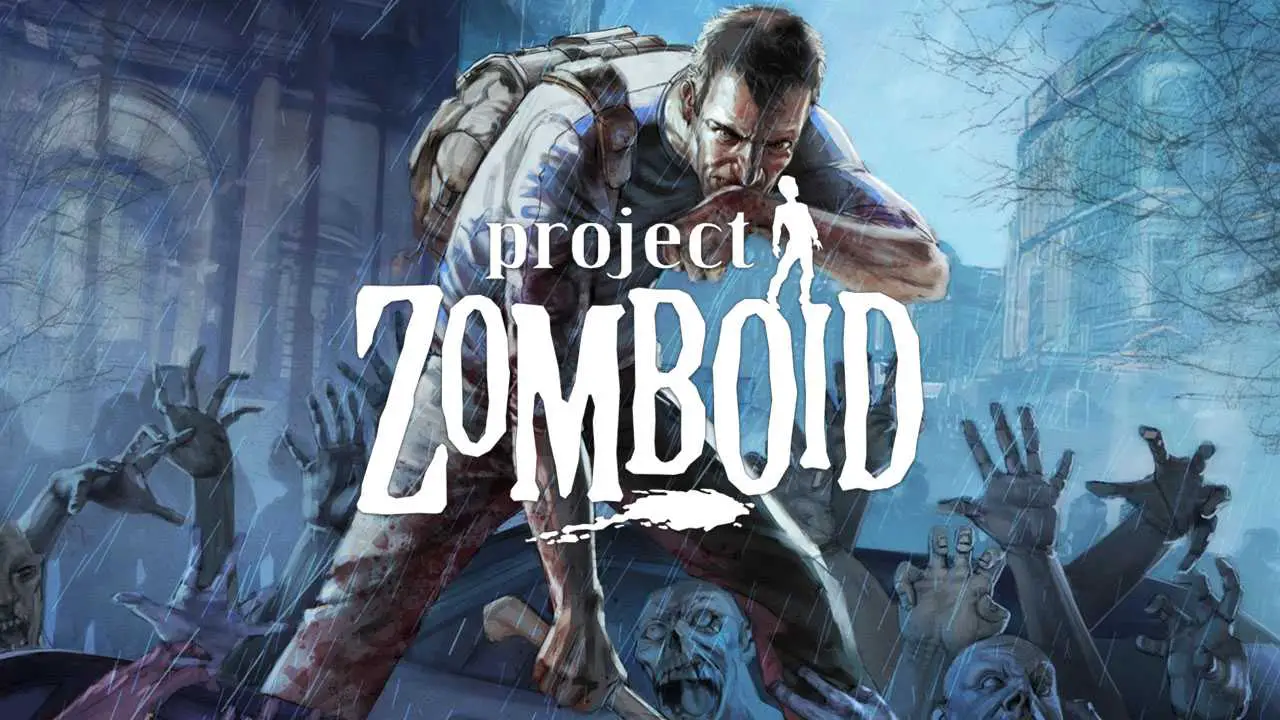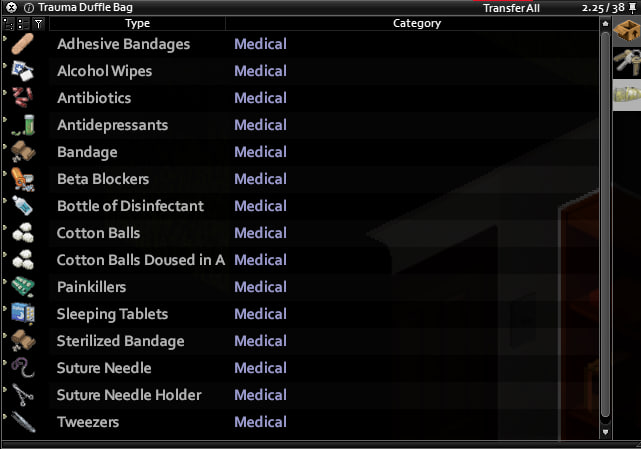This guide aims to provide assistance to players in dealing with medical situations in Project Zomboid. It will cover the locations of medical supplies, their purposes, and offer tips on how to make the most out of the available resources.
Overview of Basic Medical
In Project Zomboid, injuries are a common occurrence, and knowing how to treat wounds is essential for survival. With the right supplies, you can recover from various injuries, except for bites, which are typically fatal.
The first aid skill plays a crucial role in managing medical situations. It determines the duration bandages remain effective, the speed of performing self-interactions, and the ability to assess the severity of wounds. While having a high first aid skill is beneficial, lacking it won’t pose a significant obstacle.
The provided image showcases an extensive list encompassing nearly all medical items available in the game. These items can be discovered in clinics, bathrooms, and even on zombies throughout the entire game map. Certain items, such as disinfectants and bandages, have a broad application and can be utilized for various injuries. Conversely, there are specific items like tweezers and suture needles that serve more specialized purposes. Additionally, outside of medical contexts, items like antidepressants, beta blockers, and sleeping tablets are employed to alleviate anxiety, depression, and sleep disturbances caused by nightmares.
Notably absent from the image are ripped sheets, which can be obtained by salvaging clothing items. These makeshift bandages can be fashioned by tearing apart socks found on most zombies. They can then be used to wrap and protect any minor cuts or wounds. It is strongly recommended to promptly bandage any injuries in the game, as it not only helps expedite the overall healing process but also minimizes the risk of infection.
Should you have any inquiries or require further clarification, please feel free to leave a comment below. I will gladly incorporate additional information and respond to your queries within this guide.
Bandages
Each bandage in the game has three distinct states: dirty, clean, and sterilized. These states can be found in different locations and can be interchanged. While the primary function of bandages is to stop bleeding, they can also be utilized to address infections or treat persistent injuries.
Dirty bandages can be obtained from trash bins or deceased zombies. To cleanse these bandages, water is all that is required. This water can be sourced directly from sinks, toilets, or even water bottles. It’s worth noting that dirty bandages may also arise when a clean bandage remains on a wound for an extended period. Applying a dirty bandage or leaving one on for too long can heighten the risk of infection.
Clean bandages can be found in bathrooms and clinics. They can be created by utilizing water to transform dirty bandages. These clean bandages aid in the gradual healing of wounds. By applying a clean bandage to a healing wound, you can safeguard it against infections while simultaneously halting any bleeding.
Among the most effective bandages are sterilized ones. These bandages combine the properties of a regular bandage and a disinfectant, enabling easier and faster treatment, prevention, and bandaging of infected wounds. They are especially beneficial for treating burns. To create a sterilized bandage, combine a ripped sheet or regular bandage with a bottle of disinfectant.
Adhesive bandages are single-use and transition to a dirty state once utilized. They cannot be sterilized, so it is necessary to pair them with disinfectant supplies. Nonetheless, adhesive bandages still fulfill their function by preventing excessive bleeding.
Disinfectants
Contracting an infection from a wound can have significant repercussions, leading to incapacitation and creating a troublesome situation, especially if antibiotics are not readily available. However, there are alternative methods to address this issue, such as employing disinfectants. Various options like alcohol wipes, disinfectant bottles, and even bourbon can effectively combat wound infections. Furthermore, these disinfectants can also be applied directly to bandages to achieve the same therapeutic effect.
Alcohol wipes and disinfectant bottles can be located within clinics scattered throughout Kentucky, as well as in residential bathrooms. Notably, alcohol wipes cannot be used on cotton balls, making disinfectant bottles the preferred choice for many individuals. Additionally, disinfectant bottles contain 10 units of solution, offering a higher quantity compared to the 5 units found in alcohol wipes.
Bourbon, which can be obtained from bars and alcohol shops, presents a comparatively more accessible option for disinfection purposes than medicinal forms of disinfectant. However, it is important to note that using bourbon directly on wounds can cause discomfort and pain. This inconvenience can be mitigated by combining bourbon with a bandage before application.
Other Medical Supplies
This section will discuss several essential medical supplies: antibiotics, cotton balls, painkillers, suture needles, and tweezers. These items can all be discovered in clinics and bathrooms, and after looting one or two clinics, you should have most of them in your possession.
Antibiotics serve as medications specifically designed to combat infections, primarily those originating from wound infections. They reduce the severity of the infection, making it more manageable to treat with sterilized bandages or disinfectants. It’s important to note that antibiotics are ineffective against conditions like zombification or the common cold, so it’s advisable not to squander your supplies on treating such ailments.
While cotton balls may seem insignificant on their own, their main purpose lies in saturating them with alcohol or disinfectant. They can be utilized to treat wound infections before applying a bandage, and they are consumed upon use.
As the name implies, painkillers are employed to alleviate pain resulting from disinfecting wounds, injuries to limbs, or the presence of embedded glass shards in the skin.
Suture needles and tweezers are discussed together as they complement each other effectively. Both of these items are employed when dealing with deep wounds caused by glass shards or bullets. To address such injuries, tweezers are used to remove foreign objects from the body. While it is possible to perform this task with bare hands, there is a risk of exacerbating the injury and causing further harm. Tweezers offer a quicker and safer method of extraction.
Once the foreign object is successfully removed, a deep wound remains. To close this wound, a suture needle is required. While a suture needle holder enhances the chances of effectively closing the wound, it is not mandatory. Once the wound is closed, successful treatment of a deep wound is achieved. In a pinch, a sewing kit’s needle and thread can be used as a substitute for a suture needle, but expect greater discomfort when doing so.
Wounds
Project Zomboid features various types of injuries, each capable of causing detrimental effects to the player character. The following are the different injury types:
- Bites: Being bitten in Project Zomboid results in a game over. There is no recovery from a bite, and it gradually leads to the player character’s transformation into a zombie. It is crucial to exercise caution and avoid turning your back on zombies, as the chances of being bitten from behind are higher.
- Bleeding: Bleeding occurs when the player character is cut, scratched, shot, impaled by glass shards, or bitten. It accompanies most wounds that break the skin but is relatively easy to treat. Applying a bandage to the wound stops the bleeding over time. Regularly replacing the bandage ensures proper healing and prevents complications.
- Burns: Burns are the most time-consuming injuries to address, as they require an extended period to heal. To treat a burn, it is essential to keep the affected area covered with a clean bandage until it fully heals. Sterilized bandages are particularly suitable for this purpose, although any clean bandage will suffice.
- Deep Wound: Deep wounds pose significant risks, as they can take a month to heal if left unstitched. However, closing the wound with a suture needle is sufficient for treatment. It is important to note that stitching the wound causes pain.
- Lodged Bullet / Glass Shard: Lodged bullets or glass shards often accompany deep wounds, and they need to be removed to properly treat the injury. Tweezers or bare hands can be used for the extraction. Tweezers are the safer option, as they minimize the risk of worsening the wound. Disinfection is crucial after removing the lodged object.
- Scratches: Scratches are common injuries resulting from zombie attacks, accidental contact with fences, or tripping. Treating scratches is straightforward, as they can be easily addressed with bandages. However, if a scratch is caused by a zombie, there is a 7% chance of infection leading to zombification and eventual death.
- Lacerations: Lacerations are more severe versions of scratches. They are longer-lasting, cause more substantial health loss, and carry a 25% chance of death through zombification. However, the treatment remains the same: keeping the wound clean, properly bandaged, and disinfected to prevent further complications.
- Infections: Infections can result from using dirty bandages on wounds or may occur naturally. Treating infections can be achieved by using bourbon, bottles of disinfectant, or alcohol wipes. Sterilized bandages can be utilized to simultaneously treat both the wound and the infection.
It is crucial to carefully manage and address these injuries in Project Zomboid to ensure the survival and well-being of the player character.



